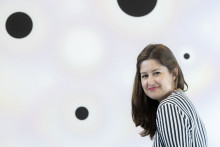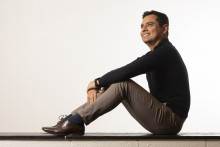Monica Pena Acosta
PhD research topic: Data-driven examination of the UHI (Urban Heat Island) phenomenon at street level resolution
Works at: Construction Management & Engineering (CME) group, Faculty of Engineering
Studied: Civil & Environmental Engineering, Korea Advanced Institute of Science and Technology (KAIST)
Originally from: Bogota, Colombia
‘I’m originally from Colombia, but I often joke that I’m half Korean, because I lived in Korea for six years during my Bachelor and Master studies. I was always adventurous and I wanted to travel. When I heard about a scholarship to study in Korea, I quickly applied and was accepted. When I was finishing my Master’s degree, I was debating whether to continue with my plan to pursue my PhD in Korea or not, but then a Dutch exchange student stole my heart and brought me to his lovely country. Here I began looking for a good professor focused on sustainable infrastructure. I went to different universities interviewing potential supervisors because I knew that good supervision was a key factor behind a successful PhD journey.
I think I always wanted to be a scientist. Even as a kid I was very curious and critical, asking way too many questions and annoying my parents. I’ve always had an engineering mindset but never really thought about it until I went to Korea. During the first year of my studies, we took all types of engineering courses and soon I realized that it was civil engineering I wanted to focus on. As civil engineers, we shape the world we live in. We make mark on the world. That really appealed to me.’

‘In my PhD research, I use data to give voice to infrastructure. I aim to understand urban phenomena, specifically so called urban heat islands. As you might have noticed, it’s always a bit warmer in a city compared to the countryside. I want to understand how and why this happens through various data, such as the heights and materials of buildings, the layout, the amount of green spaces and so on.
For one of my studies, I developed a special bicycle with sensors to measure temperatures in the city. Essentially, I spent a year cycling around Apeldoorn, where I live. Twice a week, three times a day, I went out on this bicycle, cycling the same exact route to collect data. It was really fun. The bike included a long pole, so people would often ask me what I was doing or if I was sick and needed help. It was funny. And it won me a Best Paper Award at a conference recently. That was really nice. As PhDs, we often feel like we are failing, like we are not doing well enough. Having these recognitions makes it all worth it. They give you a boost and help you stay on the path.’

‘I’m at the end of my PhD journey and it was nothing like I expected. I worked as a research assistant in Korea, so I knew what it was like. But it is one thing to “know” and another to actually live it. I expected it to be difficult, but I didn’t expect it to be so emotionally difficult. Sometimes you just don’t know where you are going and it gets to you. But you get through it. You find a support system, like other doctoral candidates, your family, your partner; they make you resilient, and that helps a lot. I didn't expect that part to be so important. But it really makes a huge difference.
I like working in science. I really enjoy creating new insights, contributing to knowledge. You contribute something that didn’t exist before. I also like teaching, and so I definitely want to stay in academia. Unlike many others: I’m a researcher who likes to teach as well. I like being around students and I want to keep doing research. I love science. It gives you the right to question everything. Nothing is taken for granted. In fact, if you don’t question things, you are doing something wrong as a scientist.’








